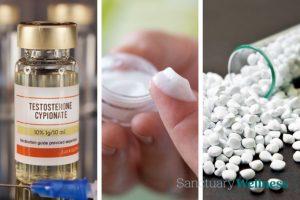- John DiBella
- Published: October 25, 2024
- Fact-checked by Dr. Desiree Granados

Testosterone is a crucial hormone that plays a vital role in male development and overall health. While it is often associated with muscle growth, energy, and sex drive, too much testosterone can have negative consequences. Understanding the signs of high testosterone in men is essential to maintain a healthy balance.
Whether you’re trying to assess your hormone levels or simply curious about how testosterone affects the body, this guide will help you recognize the signs of high testosterone and know when it might be time to take action.
What Is High Testosterone?
Testosterone levels in men fluctuate depending on various factors such as age, lifestyle, and overall health. The medical consensus is that natural testosterone levels for an adult male can range roughly between 300 and 1,000 nanograms per deciliter (ng/dL). Levels below 300 ng/dL are considered low, while levels above 1,000 ng/dL are deemed high.
The American Urological Association states that the optimal testosterone range for a healthy male is between 450-600 ng/dl. This is the middle third of the normal range used by most labs, where people typically experience the best physical and mental benefits.
Having elevated testosterone levels isn’t necessarily a bad thing; many men with high testosterone may experience positive health benefits. However, if testosterone levels become excessively high, it can cause several unwanted side effects.
The threshold for “too high” testosterone varies, but most experts agree that consistently being in the upper end or beyond the 1,000 ng/dL range can be problematic. An imbalance may be caused by natural factors, such as genetics, or through the use of testosterone-enhancing products like anabolic steroids or supplements.
Wondering if you might have low testosterone? Take our quiz to find out!
Symptoms of High Testosterone
Recognizing the symptoms of high testosterone is key to understanding how it affects the body. If you’re wondering how to tell if a man has high testosterone, you may notice the following signs:
Healthy Symptoms of Increased Testosterone in Men
Increased muscle mass and strength: Testosterone plays a major role in muscle growth. Men with higher levels often experience enhanced muscle-building capabilities.
- Higher libido: Testosterone is linked to sexual drive, and elevated levels often result in a stronger sexual desire.
- Improved energy levels: Men with higher testosterone tend to have increased vitality and feel more energetic throughout the day.
- More assertive and confident behavior: Testosterone can influence mood, with some men feeling more confident and assertive when levels are high.
- Denser bones: Testosterone supports bone density, helping to reduce the risk of fractures or osteoporosis in men with healthy levels.

Signs of Too Much Testosterone
While higher testosterone may seem advantageous, having too much testosterone can lead to undesirable effects:
- Acne and oily skin: Excess testosterone stimulates sebaceous glands, which can cause acne breakouts and greasy skin.
- Mood swings or irritability: Elevated testosterone can cause emotional volatility, leading to anger, frustration, or irritability.
- Aggressive behavior: High testosterone is sometimes associated with increased aggression or risky behavior.
- Sleep disturbances: Some men may experience insomnia or poor sleep quality due to excessive testosterone levels.
- Reduced sperm count: Paradoxically, too much testosterone can disrupt sperm production, potentially affecting fertility.
- Enlarged prostate: High levels of testosterone may contribute to prostate enlargement, which can lead to urinary problems.
- Headaches: Testosterone fluctuations or excessive levels may trigger frequent headaches.
- Hair loss: Excess testosterone, particularly in the form of dihydrotestosterone (DHT), is linked to male pattern baldness.

How to Increase or Decrease Testosterone Levels
Maintaining balanced testosterone levels is critical for overall health. Depending on your symptoms, you may want to decrease or boost your testosterone. Here are some strategies for both:
Ways to Boost Testosterone
- Exercise regularly: Strength training, especially weightlifting, is known to naturally increase testosterone.
- Get enough sleep: Poor sleep can lower testosterone levels, so aim for 7-9 hours of restful sleep each night.
- Eat a balanced diet: Incorporating foods rich in zinc, vitamin D, and healthy fats can help support testosterone production.
- Reduce stress: Chronic stress elevates cortisol, which negatively impacts testosterone levels. Practicing stress management techniques can help keep testosterone in check.
- Consider testosterone replacement therapy: If you have consistently low testosterone levels, consulting with a doctor about testosterone replacement therapy could be an effective solution.
How to Decrease Excess Testosterone
- Avoid anabolic steroids: Taking steroids or other synthetic testosterone boosters can lead to dangerously high testosterone levels.
- Focus on a healthy diet: Avoid excessive sugar and processed foods, as they can contribute to hormonal imbalances.
- Maintain a healthy weight: Excess body fat can interfere with hormone production, so maintaining a healthy weight is important for testosterone regulation.
- Seek medical guidance: If testosterone levels are extremely high, medication or other treatments prescribed by a doctor may help bring them down.
When to See a Medical Professional
If you suspect that your testosterone levels are too high or too low, it’s important to consult with a healthcare professional. Signs that indicate you should seek medical advice include persistent mood swings, unexplained changes in sexual function or desire, difficulty sleeping, or other symptoms associated with hormone imbalances.
A doctor can provide a comprehensive evaluation, including a blood test to measure your testosterone levels. If necessary, they may recommend lifestyle changes, medication, or treatments such as testosterone replacement therapy. Since hormonal imbalances can have various underlying causes, a healthcare provider will help pinpoint the best course of action tailored to your specific needs.
Conclusion
High testosterone levels can have both positive and negative effects on a man’s body. While increased testosterone often brings benefits like enhanced strength, energy, and libido, too much testosterone can lead to issues such as mood swings, acne, and sleep disturbances.
Understanding the signs of high testosterone and maintaining balance through healthy lifestyle choices or medical interventions is key to overall well-being. If you’re concerned about your hormone levels, don’t hesitate to consult a medical professional for guidance.
States Where We Offer Medical Marijuana Card Services
How we reviewed this article:
- Tony Rehagen (2024). Keep Testosterone in Balance
https://www.webmd.com/men/features/keep-testosterone-in-balance - American Urological Association (2024). Evaluation and Management of Testosterone Deficiency (2024)
https://www.auanet.org/guidelines-and-quality/guidelines/testosterone-deficiency-guideline - Harvard Health (2023). Testosterone: What it is and how it affects your health
https://www.health.harvard.edu/staying-healthy/testosterone–what-it-does-and-doesnt-do - Jayne Leonard (2023). What are the signs of high testosterone in males?
https://www.medicalnewstoday.com/articles/signs-of-high-testosterone - Rachael Ajmera (2023). 8 Proven Ways to Increase Testosterone Levels Naturally
https://www.healthline.com/nutrition/8-ways-to-boost-testosterone - Sian Ferguson (2023). 10 Testosterone-Killing Foods
https://www.healthline.com/health/testosterone-killing-foods#sugar
Current Version
October 25, 2024
Written By
John DiBella
Fact-checked By
Dr. Desiree Granados
Editorial Process
Our Editorial Process

John DiBella is the co-founder and CEO at The Sanctuary Wellness Institute. His goal is to foster healthier lifestyles to improve individuals’ quality of life and health span through online medical and non-medical services. When he’s not writing health & wellness articles for The Sanctuary, he enjoys hiking, camping, surfing and sailing.







